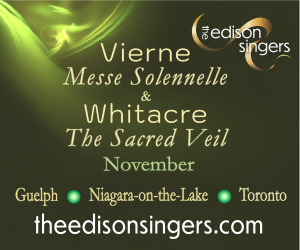|
About a month ago, when I first perused the brochure for Toronto Summer Music, it suddenly struck me that this is quite an unusual festival. In it, I found an array of prominent pianists, string quartets, and other ensembles – all playing classical music. What's up with that? Where are the Dixieland bands, the Celtic harpers and the guitar-wielding singer-songwriters that a summer festival is "supposed" to have? (To read what artistic director Agnes Grossmann has to say about her approach to programming, see my interview with her in the July-August issue of The WholeNote.) I'd like to say "brava" to Grossmann's programming. I’m pleased that in the year 2009 there’s at least one festival out there that isn’t ashamed to be just classical. |
Now don’t get me wrong: I'm a big supporter of musical diversity. We at The WholeNote are proud to cover classical, jazz, world and folk musics in our magazine. And I've got nothing against a summer "classical" festival spicing things up with non-classical fare.
But what bothers me about the inclusion of non-classical music in festivals that were once almost entirely classical – the Ottawa Chamber Music Festival, for instance – is that this spirit of openness seems to be pretty much a one-way street. Classical festivals are displaying an openness that I don't often see mirrored elsewehere. How many jazz or folk festivals are adding classical music to their programming? Does anyone expect them to?
And it's not just the festivals. Since CBC Radio 2 radically changed its format last year, have CHUM FM or JAZZ FM or any other non-classical broadcasters increased their classical content?
As the "cultural space" devoted to classical music – which has never been very big in Canada – is eroded in the name of diversity, the result is a net loss for Bach, Beethoven and Brahms. How's about some reciprocal gestures of support from other musical camps?




